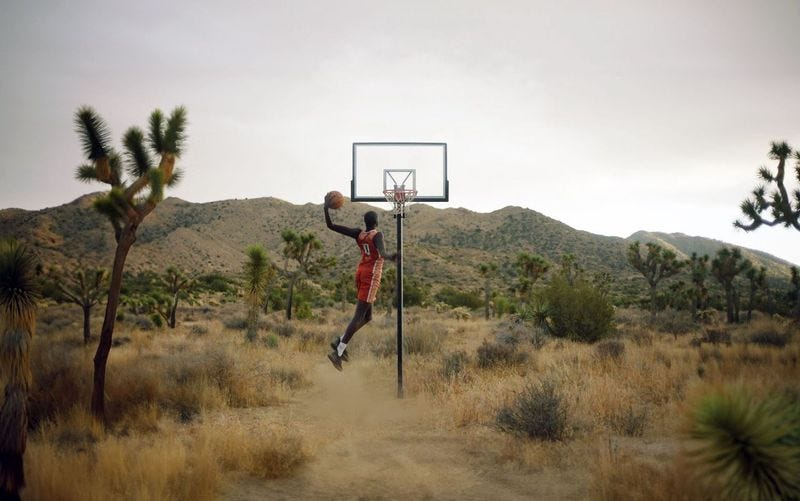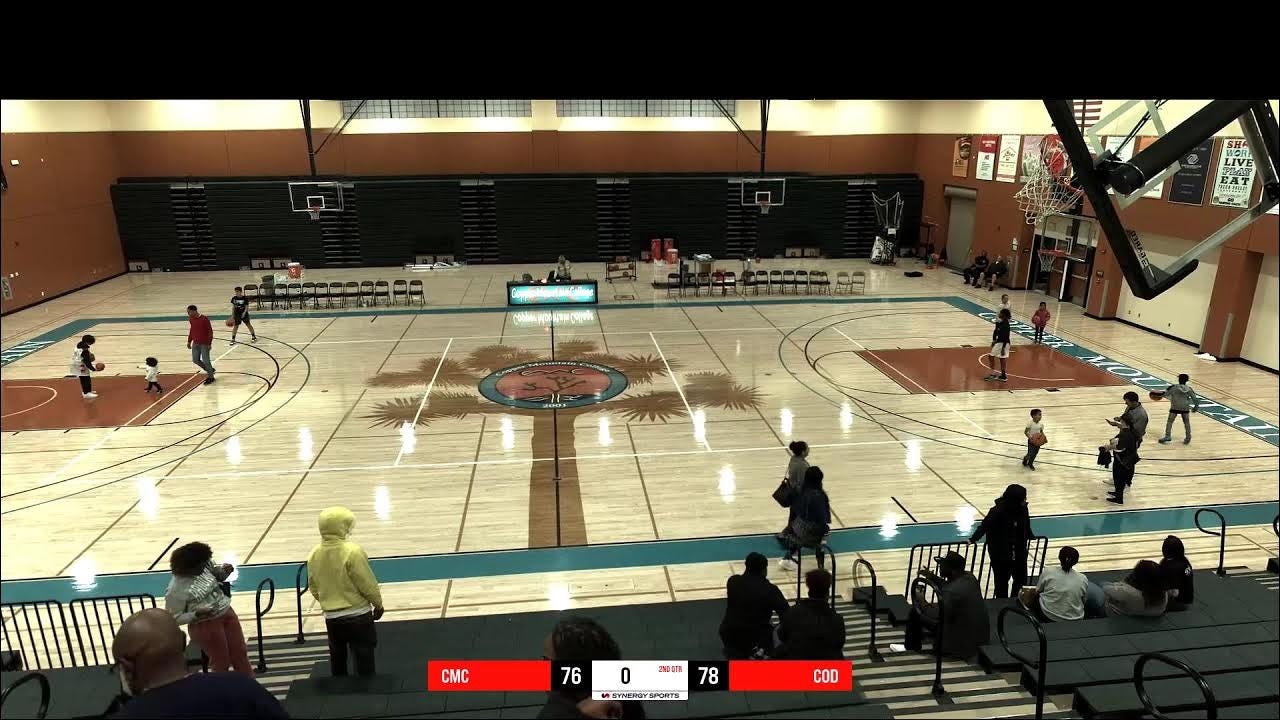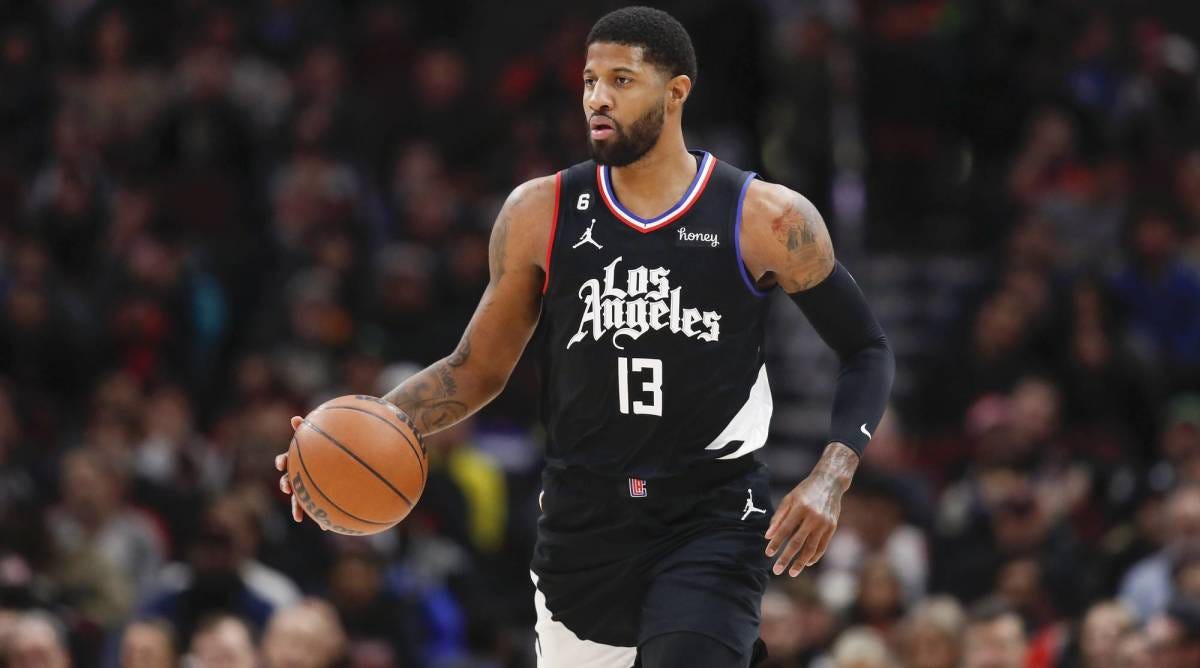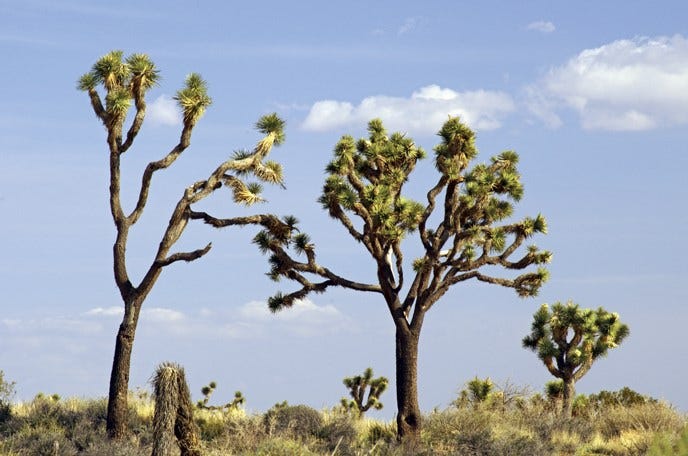Amongst the Trees - A Shining Star in the Desert
An interview with Jack Jensen, one of the directors of the new college basketball documentary "Amongst the Trees"
One late night about five years ago, Jack Jensen, a Los Angeles-based filmmaker who, to that point, worked primarily on commercials, went down one of those internet rabbitholes as he was searching for basketball courts in Joshua Tree, California.
That random beginning ended up being the tip-off for what is now a feature-length documentary film about the community college basketball team at tiny Copper Mountain College, which debuted at Palm Springs International Film Festival on the 6th and 13th of January.
Directed by Jensen and fellow filmmaker and basketball fan Trent Ubben, “Amongst the Trees”, follows the upstart men's basketball program at Copper Mountain College -- a tiny community college in the middle of the Mojave Desert in Joshua Tree, California -- during the final week of their season. In just its second year of the team's existence, the film drops viewers directly into the action as the Fighting Cacti make one last push for the playoffs.
I had the pleasure of being able to sit down with Jensen this weekend and had a wonderfully insightful conversation about the project, how it came into being, and what it was like being present for the defining moments shown on screen.
What initially drew you to the project? I've seen a couple of things online about late night Wikipedia deep dives and stuff like that, but what was it specifically that initially drew you into this story?
“Initially, honestly, like there's kind of like a pageantry to the desert that's really interesting, you know, like being in Los Angeles, this ability to almost transport yourself to another planet two hours away is really unique. And so I'd gone out there for months and just felt like the landscape was really interesting, and I just, I'd never seen sports represented there yet. And so that's kind of where like, just the beginnings of like an idea for it, which was how are people playing sports out there, which led me to this team that had just kind of gotten started. And then honestly, like pretty serendipitously, it just kind of kept rolling from there. Like they had another coach at the time when I first hit them up.
And then, you know, I found out, that they had rented Enterprise vans to shuttle the guys to the teams. They didn't have jerseys. They didn't have trainers. They had never had a basketball team. They never had a sports team in this town to root for. And it's really interesting as Joshua Tree, which is a far different part of like the Mojave Desert than Palm Springs or something, which is a lot more money and glitz and, and just kind of things going on. So I just found it really, really interesting. And then from there, you know, when I found out the coaches that had taken over were related. And then we found, you know, Tawni Kelly, who was both their wife and sister, who then just was like this incredible character. But yeah, initially it was, it was really just the allure of like, sports never really being seen in the desert and then kind of this story just unfolded organically from there.”
There’s dramatic action on the court to be sure, and plenty of controversy to witness also, but really this film is all about the personalities and lives of this mismatched collection of coaches and players from as far away as Mississippi and Alabama to local stars from Rancho Mirage and Twentynine Palms.
At the heart of the documentary are the two coaches, Walter (Walt) Parham and Britain (BK) Kelly, who have taken on the task of getting these promising young men on the right path in life while also trying to win basketball games. It's about much more than just the buckets. It’s about the mountains of work that need to be put in across a community to support a group of young men, even in their toughest moments.
One major figure in the documentary that was a big surprise was Tawni Kelly, the wife of assistant coach BK and sister of head coach Walt. She plays a large role in each game as the eyes, ears, and voice of the fans in the crowd and audience watching at home:
“Tawni's amazing. That was, it felt like found money when we were at the games. We had heard about her, but we had no idea until that first game. So I think it was just like, wow, one, this is real to this is incredible.
Like if we can bottle up all of the passion and energy that you'd want any crowd to have, like it's all wrapped up in this one person. Who then also is like super motivational and loves the kids and keeps in touch with them. And she's texting the kids during the day. And so it just all felt really authentic and real. And then like, you know from seeing it as a viewer, she's like absolutely hilarious. She's talking through it. She means well, she just, she talks and works her way through every event. She just can't stop herself, you know. She's going to say what she wants, and she’s not gonna care what anyone thinks. And like you can clearly tell that when watching the footage back.
I'm not sure how many college kids I've seen that have turned to one specific fan and, you know, shushed them during a free throw. And that was like, to me, that's my favorite shot in the film, when she's talking to the opposing player at the free throw line. And that just like encapsulates her passion and that of like BK and Walt's passion, just in “I don't care if there's 10 people in the gym, if there's 10,000, like, I'm going to support this with my whole heart”. And I think she’s just the perfect representation of that support system, you know? She's incredible.”
Another thing about the games, was it a choice or was it out of necessity that you drop the viewer straight into these high tension playoff games towards the end of the season?
“Bit of both, honestly. We felt like, you know, this isn't the NBA finals, it's not Duke. So to keep people engaged in this, we thought in general, like, you know, you, you grow and care for these characters, you want them to win, but the actual like, you know, passes and shots of an entire game is just not, not needed. And I think we've also looked at a lot of sports docs too, and ones that had such a heavy focus on the game, it felt like that became then the story. We wanted to tell a story where sport facilitated, you know, a way for these, these kids and these coaches to like push on them their journey.
And so you're rooting for them as people to then hopefully do well at their job. But then, you know, too, we wanted to keep it, you know, it is lean, the film itself in terms of like the decisions we made on what to cut. We wanted to keep people's engagement up. I think a lot of that stems from we just learned a lot of different pacing from both Trent and I have directed a lot of commercials over the years and learning about that type of pacing and just keeping audiences engaged and excited for the next thing. And it felt like that hit both, you know, really well and in leaning into the drama of game two. That second one felt like the right decision but to that point I don't think we needed to see, you know, a set up play 10 minutes into the first half.”
Recently, Los Angeles Clippers star forward Paul George set up a production company with his sister, Teiosha George. Both of the George siblings have joined on and become executive producers for this documentary. I asked Jensen what having both of them involved has been like and how they’ve helped the documentary along the way, especially given Jensen and Ubben’s past working with stars like Kobe Bryant.
“He's great. You know, I mean just like as a fan myself outside of work, you know, it's hard to not be a big Paul George fan if you love basketball.
So just on the on the surface, like it's fantastic to be partnered with him on this. I think he’s like so many other superstars that are trying to build out their portfolio off the court, they're looking to tell stories and be a part of stories that that mean something to them. For him, you know, Paul George is from a town called Palmdale, which is, you know, similarly to Joshua Tree, it's in the Mojave Desert, in the shadow of Los Angeles. He went to Fresno State, which is a giant basketball powerhouse. But yeah, so he understood coming out of nowhere in a sense, even in the shadow of like one of the biggest metropolitan areas in the world. And so we felt like he could connect with it really well.
And he did. In terms of like the background, you know, I've worked, I worked a lot in basketball, my prior to, you know, becoming a director and have been a writer at basketball magazines, and we have worked with so many athletes over the years, that natural partnership has always felt really authentic. And, you know, the athletes have a voice in this stuff. And we were really curious to see him, you know, what he thought of the film and where he wanted to push it. But yeah, from a high level, it's been great having him be a part of this, as well as RTG features, which is connected with Slam Magazine too. So we knew they understood great storytelling and basketball. So it's a really nice combo.”
I've always wondered, especially with documentaries, how it's possible that creators are able to actually focus in on the action enough and pull themselves away from what's happening so that they can film what is happening in front of them. What is it like filming these games? And are you kind of locked in or do you find yourself reacting to calls and shots during the games?
“That's a great question! It’s a little bit of both. Like Trent and I had talked about this previously. He was on pins and needles almost on every basket as well!
That to the point where I think he like almost snapped himself back into it. Like, we're filming right now. You know, he's, he's so excited about it as like a, just a fan of these kids because, you know, in the large scheme of things. we're not telling an investigative journalism piece, like the part of getting great footage is getting their trust, right? So they can be vulnerable and be open on film.
And so there is just, as a human being, a big part of you that wants them to succeed first, you know I've, in my previous career, I've been to a lot of games as a writer. And so I kind of gained like a callus to watching games and trying and holding in emotion and cheering. So a little different on that in terms of like my ability to focus.
But yeah, just as a fan of this family that they've built out there, it was hard to not be stoked for them on that comeback, you know. But selfishly, we knew we were getting great footage. And I think when we were out there, what was really interesting is we were kind of bummed because… Oh, it would have been so great, this hero's journey of them making it in. We ended up getting such better life lessons and a journey completion in the end actually, because I think those guys (the coaches) make it with their speeches. So, you know, it's a testament to just kind of like let the game flow as it's going to flow, let life flow as it's going to flow to be able to put together a great documentary.
Related to that, and with no spoilers for what's going to happen for anyone that will be reading, but the final significant call that we get in the last game, what was your reaction in the background while you're filming that?
“Similar confusion a little bit. And I don't know if you had gotten that on on film too, but it kind of, it happened fast, you know, at that last play and there are people on the court and the refs were convened, then the whistle blew and it was just kind of mass confusion. And there's so much emotion that's been built up because they need to win that game for the playoffs, and also, it’s Sophomore night, so for a lot of those second year guys, that's the last time they're going to play at that stadium, and now they have cameras there.
You can just tell like an emotional surge kind of happened. So it had felt like a movie there that they obviously were going to come back and make that shot. And then when reality hit, I think it just became kind of confusing. And so we just try to capture that. But I think all those factors really added to this kind of uniqueness of the moment. But I remember just kind of darting my eyes and trying to get our DP to capture as much as we can as this confusion in the crowd and on the court just like kind of swelled.”
And finally, are there any future plans to follow the team or follow the journey of certain people in any kind of way?
“No, no current plans with CMC. But like we loved the obviously the journey that this took. Trent and I mostly are separately developing other projects as well. So we're always like trying to build new stories and looking to continue to build out more features and stuff.
But no, no current plans with CMC. But as with, you know, any college sports and like you said yourself, you're a sports fan, like the turnover in college year to year is so interesting. You never know what team you're going to get until you all show up, you know, for the training camp segment.
So you never know. Yeah, maybe there maybe there's more opportunity out there now it's the whole new group.”
Review of the Preview
The Joshua Tree is such a fitting symbol for this team. This tree, native to the arid Southwestern United States, is commonly said to have been given its name by a group of Mormon settlers crossing the Mojave Desert in the mid-19th century: The tree's role in guiding them through the desert, combined with the unique shape of its branches, reminded them of a biblical story in which Joshua keeps his hands reached out for an extended period of time to enable the Israelites in their conquest of Canaan.
It’s a symbol that truly represents so much to so many. As an Irishman, it initially brings to mind the title of U2’s fifth and (I will not be entertaining any debate over this) best album.
Just like “The Joshua Tree” album, the potency of this team, the reason each member of the squad and, particularly the coaching staff of best friends and brothers-in-law Walter Parham and Britain (BK) Kelly, are so endearing, and the cause that they fight for in every moment draws you in so much, lies in a kind of spiritual frustration. A sense of hunger and tension which roams around every moment that we’re with them, embroiled in their fight, in search of some climactic moment of release, looking for that fulfilment all of us search for, which may or may not arrive.
Whenever this documentary becomes available to view, go watch it. Drink in the wonderful soundtrack. Feel the trembling tension.
Join The Fighting Cacti in just their second year of existence, and experience how, just like their symbol which dominates this fantastic documentary, Copper Mountain College deserve to be recognised as one of the fastest growing species in the desert.
Thank you to Jack Jensen for answering my questions, to Prodigy PR, Staley Sharples and Alex Donaldson for setting this meeting up, and again to Jack and Trent Ubben for a wonderful documentary which I recommend you all watch as soon as it’s available in your area. I’ll be sure to keep you all posted when it’s released.





